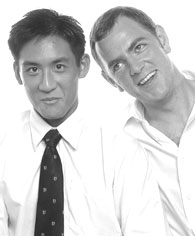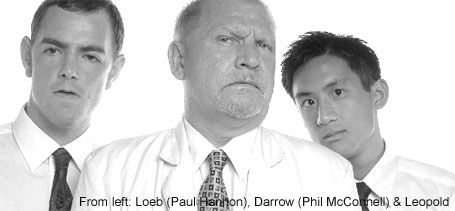Never the Sinner documents the true story of the Leopold and Loeb murder case of 1924 Chicago. Two young wealthy intellectuals, Nathan Leopold and Richard Loeb, shocked the city and the nation by kidnapping and brutally killing a 14-year-old boy for no apparent motive.
Believing themselves to be Nietzschean 'supermen,' not bound by conventional morality, they set out to 'stun the world.' Indeed, they seized the imagination of the public and press at the time - Chicago, 1924 - and until the sensations of OJ Simpson and Michael Jackson, remained the "trial of the century."
The duo had the details of their friendship drawn up in a legal document which includes sexual acts. A legal document cited in the play reads, "Leopold would take part in crimes primarily to accommodate Loeb and Loeb would take part in sexual acts primarily to accommodate Leopold."
Clarence Darrow, the world-famous lawyer, said by many to be the finest American legal mind of the century, came out of retirement and eventually saved the two young men from the rope. His summing up is seen as the greatest of all speeches against the use of capital punishment.
Written by John Logan who is credited for two Oscar-nominated screenplays - Gladiator and The Aviator, the play delves into many relevant social issues, including the place of capital punishment in a "civilised" society.
Never the Sinner is directed by Daniel Toyne (Twelfth Night, Talking Heads) and features Paul Hannon (Twelfth Night, Oh, What a Lovely War! ), Phil McConnell (The Caretaker, Twelfth Night) and sensational newcomer Hansel Tan Shen-Wei who was in the 2002 Anglo Chinese Junior College production of the same play.
Fridae.com is the official media of Never the Sinner.
Never The Sinner: A love story by John Logan
Directed by Daniel Toyne
Cast: Hansel Tan Shen-Wei, Paul Hannon, Phil McConnell, Maureen McConnell
Venue: DBS ARTS CENTRE ~ Home of SRT
Date/Time: 22 - 25 February 2006, 8pm
Tickets: $40 & $30 (50% discount for students and NS) - available from SISTIC. Fridae users enjoy 15% off when they give the password "superman."
Click on the next page as director Daniel Toyne reveals more about the dynamics between Leopold and Loeb, and the first kiss between co-stars Paul and Hansel that was "perhaps a little too energetic!"
Fridae chats with director Daniel Toyne about the play, cast and their characters, relationships and co-dependency, and the death penalty.

Daniel: John Logan reminds everyone in his preface to the text that it is a love story. He writes: "The real provocation of Leopold and Loeb is that we all could, given some unkind twists of fate and character, be them. We have all loved someone too much. We have all had our hearts broken. We have all wanted to prove our everlasting devotion. We have all looked quietly at our loved one across the room and thought to ourselves, 'I'd die for you�I'd kill for you�'"
There was certainly a co-dependency - but this is true of most relationships; there was also a situation where one was more loving and the other more loved; yet this is true of nearly all relationships. It was not an abusive relationship; everyone argues. Yet in 1960, when Loeb had been dead nearly 25 years, Leopold said that he was still deeply in love with Loeb, and in 1971 died with his photograph beside him. Notice the word "primarily" in "Leopold would take part in crimes primarily to accommodate Loeb and Loeb would take part in sexual acts primarily to accommodate Leopold." It was not all sex one way and all criminality the other. It was not an exchange, but a basis for their relationship. All relationships are different, and this is the way theirs worked.
æ: What aspects of the characters do you think will intrigue audiences the most?
Daniel: Several things - though I don't want to mention everything - I'd like to keep some surprises! Leopold and Loeb are extraordinarily attractive characters. Again, to quote Logan: "I was seduced. I was completely captivated by Leopold and Loeb. Their flash and glimmer and panache and smug brilliance had taken hold. To my mind, they were the two most magical human beings who had ever lived." Yet they behave without any moral qualms; have no remorse, shame or guilt about their crimes. We see in them a mystery, an unknown, possibly a face for evil - a magnetic attraction. Their developing relationship, their love and the power struggles and mind games of their friendship are fascinating. They were attracted to each other - as we so often are - for all the wrong reasons. Logan says of this: "They could not find their way in our sunlit world, so they embraced the darkness. In the darkness, they had only each other."
æ: Tell us more about your cast and especially the newcomer Hansel Tan.
Dabiel: Hansel was the first person I auditioned, and he set the standard. I was immediately impressed by his willingness to give 100%, to try everything, not to hold back. I saw 15-16 possible Leopolds and/or Loebs, and there was never any doubt in my maind that Hansel and Paul were the ones. There was some hesitation in the first rehearsal or so - after all, they spend most of the play within inches of each other, have to be comfortable with each other, dance, kiss - and they were complete strangers.
Within a couple of days however they were working very well together - the first kiss was perhaps a little too energetic! - but after the first time it's just been "all in a day's work."
With one of the pair called Hansel, you can imagine what most of the cast call the other one!
Apart from the Leopold and Loeb dynamic, the two lawyers - who spend most their time fighting - are in real life a married couple (Phil and Maureen McConnell), which adds a certain something to the tension!
æ: What is the significance of the play to gay audiences, 80-odd years later given our understanding of sexual orientation compared to the 1920s?
Daniel: Firstly, I suspect that most young people - whether gay or other - are as confused about their developing sexuality as their grandparents were. Leopold and Loeb were horrified when they got to be known as 'cocksuckers' at their university. Have things changed?
The play explores several key questions - the nature of the death penalty, the power of the media (think 'Nation' parties), sex and violence in relationships and in society - all of which are of significance to any thinking audience. I do not think that 'gay audiences' relate simply to 'gay themes' - rather they may be (I hope) more sensitive to universal themes. Which is, possibly, why gay people make up larger percentages in theatre/opera/dance audiences than their demographic would suggest.
æ: This also comes at a time when the death sentence is taken up by its opponents in Singapore after several high profile cases. How do you hope the play will affect audiences on this issue?
Daniel: Certainly I hope that people will be stimulated by the play to keep the debate going. Although several people involved in the project are committed to an anti-death penalty position (myself included), others are not; Never the Sinner is not an anti-death penalty play and does not preach to the audience. Rather, it takes a worst-case scenario - if you accept the possibility of the death sentence, then these two young men should die. There is no possibility of them being innocent, of redemption, they act without motive (other than pleasure), and they show no remorse. This play, then, requires audiences to decide on principle, rather than on circumstance.
æ: The title comes from a line of dialogue by Loeb's and Leopold's Defence lawyer Clarence Darrow during a confrontation with the prosecutor: "I could see the sin... I could hate the sin... but never the sinner." How does this resonate with the themes of the play?
Daniel: Along with what I previously said (principle and circumstance), the play is partly a revisiting of the age-old mercy/revenge debate. However, the character of Clarence Darrow in the play, takes the argument a stage further speaking of love and redemption. He argues that 'the future' - and by that he means a developing civilisation - will be a time when 'hatred and cruelty will not control the hearts of men." (Read Clarence Darrow's "A Plea for Mercy" by clicking the link below.)












 Printable Version
Printable Version









